-
King of Forgiveness
Even the people of God can’t govern themselves in such a way that provides for the flourishing of the community. This is because all people, including the people that God calls to himself, are infected by their own selfish and self-destructive attitudes, actions, and affections.
So even when we try to rule with the best of intentions, the most thoughtful checks and balances, the best statements of human rights, we get all twisted up in our own way. Fear, greed, and pride lead to violence, war, and death. Every time. Every purely human empire falls eventually.
So, God promises steps in to rule directly. He will appoint leaders. He will raise up a human king in the line of the best human king Israel ever had, David. This king won’t fail in all the ways that David did, morally, ethically, politically. This king will finally be faithful to God’s rule…but how?
This King will be God himself come to us, as one of us.
This King is, of course, Christ himself.
This means whatever we think we know about how kingdoms are supposed to operate, supposed to be run, supposed work, takes a back seat as we are illumined by the way of Christ…which is just so very different than the kingdoms of this world.
We could think of many ways that we would establish a kingdom. But we probably wouldn’t think of allowing our enemies, foreign and domestic, crucify us under false pretenses and forgiving them anyways.
But this is what Jesus did.
Jesus' Kingdom is founded on forgiveness, ruled from the Cross, and advanced in the way of the Cross.
As naive and idealistic as that might sound, it’s how God does things. And his is the only Kingdom that will be left standing in the end.
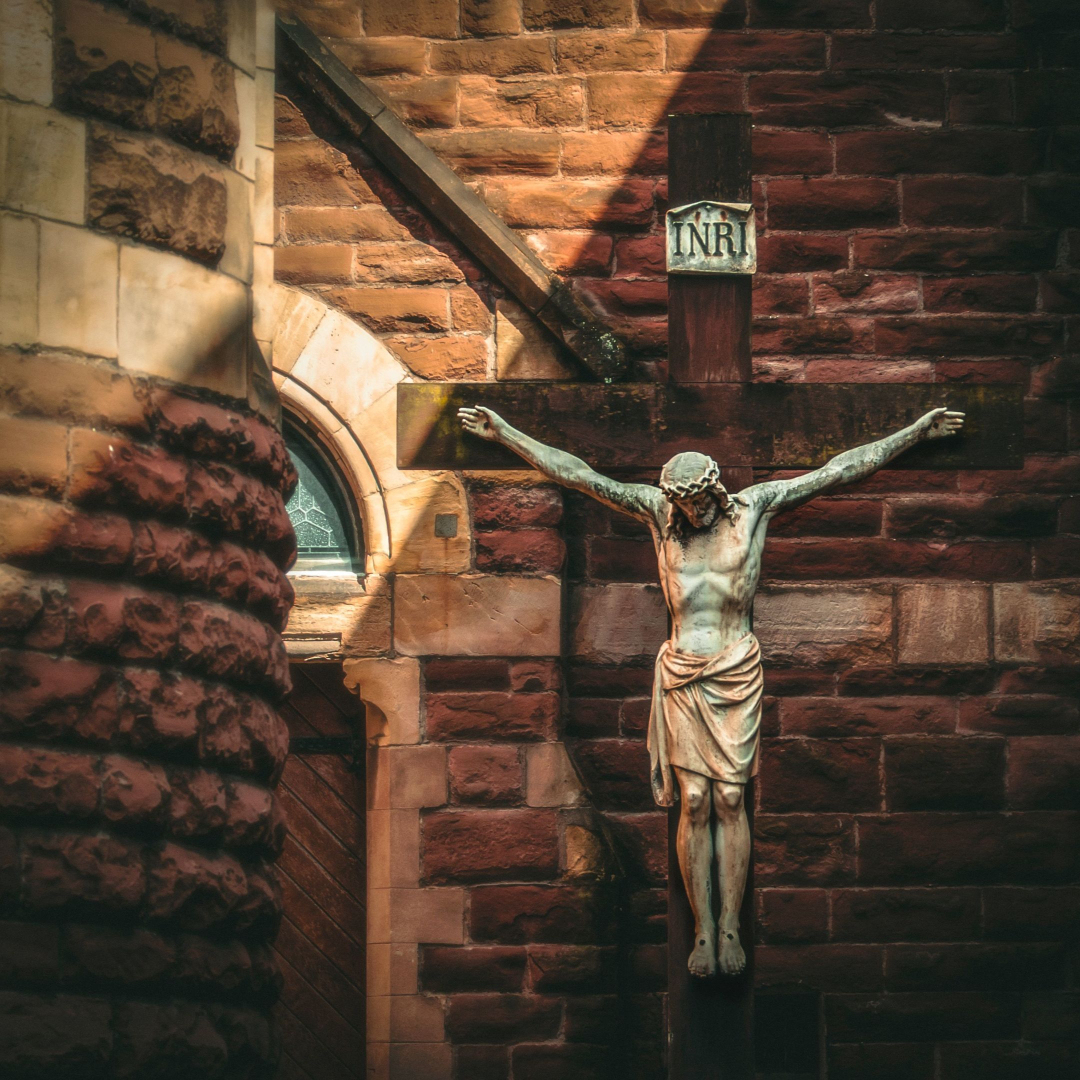
-
Without just works, our worship can't be true
Both right worship and good works are vital, but without just works accompanying it, our worship cannot be true.
Listen to what the Lord said through Isaiah:
““What to me is the multitude of your sacrifices? says the LORD; I have had enough… Bring no more vain offerings; incense is an abomination to me. New moon and Sabbath and the calling of convocations— I cannot endure iniquity and solemn assembly. Your new moons and your appointed feasts my soul hates; they have become a burden to me; I am weary of bearing them.” (Isaiah 1:11–14, ESV)
The problem wasn’t with the offerings themselves, it was that they were vain offerings. That is, they meant nothing to the people offering them because there was no genuine repentance or turning away from evil. The problem here is the hypocrisy of blatant iniquity, and the attempt to cover it over with solemn assemblies.
So, God says,
“When you spread out your hands, I will hide my eyes from you; even though you make many prayers, I will not listen; your hands are full of blood.” (Isaiah 1:15, ESV)
We can’t cover our selfish, self-destructive attitudes, actions, and affections with ritual, ceremony, or even creeds. Saying the right things, and knowing the right things are not the same thing as truly believing the word of God. Truly believing the word of God is always worked out into actions that reflect the character of God as good, compassionate, just, and merciful.
This is the first thing that God desires to please him. Right worship and ceremony can support and reflect a life lived in imitation of God, but to quench the Spirit’s leading toward this in the liturgy is nothing less than a rebellion against the living God.
Sisters and brothers, we will not win that fight.
“…the Lord Jesus…[will be] revealed from heaven with his mighty angels in flaming fire, inflicting vengeance on those who do not know God and on those who do not obey the gospel of our Lord Jesus. They will suffer the punishment of eternal destruction, away from the presence of the Lord and from the glory of his might,” (2 Thessalonians 1:7–9, ESV)
Evil will be cast out of existence, and if we keep holding on to evil, we will also experience the punishment of that purifying fire.
On our own, we have an inevitable tendency to hold on to evil. To return again to our sinful, selfish, self-destructive ways. Yet God in his mercy sent his Son to forgive us of our sins, to heal us from its effects, to set us free to orient our lives toward justice and life. ““Come now, let us reason together, says the LORD: though your sins are like scarlet, they shall be as white as snow; though they are red like crimson, they shall become like wool.” (Isaiah 1:18, ESV)
This is confirmed in a Gospel passage from Luke 19. This is the wonderful story of Zacchaeus the cheating tax collector who, upon encountering Jesus, does a complete 180. He turns from his sin and makes everything right, going above and beyond as he restored all he owed to those he cheated.
“…Jesus said to him, “Today salvation has come to this house, since he also is a son of Abraham. For the Son of Man came to seek and to save the lost.”” (Luke 19:9–10, ESV)
Notice the salvation here isn’t being swept out of this world, but rather things being as they should be in this world.
This is what is possible in the present as we trust that Jesus’ is indeed the pattern for all humanity. This what we are saved into when we receive the forgiveness of our own sins that Jesus offered on the cross, even has as he was unjustly murdered. This is how we are freed to live as we receive the same Holy Spirit that raised Jesus from dead.
It’s this experience of forgiveness and real change of heart and life that confirms the promised hope that this work of the renewal of all things has only just begun, and will indeed be completed when Jesus comes again.
It is the grace of God in Christ that makes it possible for us to “cease to do evil, learn to do good; seek justice, correct oppression; bring justice to the fatherless, [and] plead the widow’s cause.” (Isaiah 1:16–17, ESV).
-
4 parts of making peace with discernment
I think the church today would do well to emulate these practices that are evident from the Jerusalem Council in Acts 15:
-
Entering a process of discernment that includes debate, remembering core doctrine, and careful listening
-
Judgment made and articulated in light of Gospel experience and Scriptures by an authorized and trusted representative of the church.
-
Compromise for the sake of relational and public unity.
-
Clear communication not only in a published statement, but via relational face-to-face interactions
-
-
Ordained a priest 7 years ago today. So grateful to God and to those that he has called me to serve. I’m especially thankful for my wife, Amber, who is a constant support, source of wisdom, and inspiration to me as she serves faithfully in her own ministries.
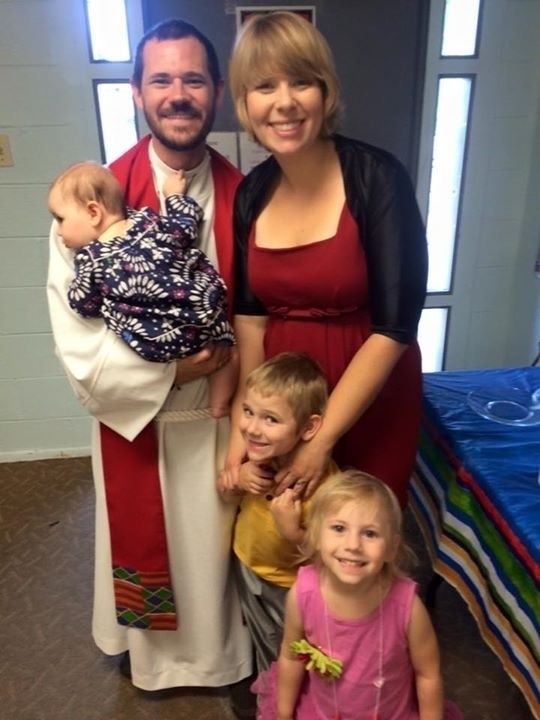
-
Practice what you pray
Prayer is what grounded and energized Jesus' life of action for the sake of the world.
Jesus practiced what he preached and what he prayed.
He was faithful in prayer; we read about it throughout the Gospels.
He also took action as he healed the sick, threw out the dishonest money changers from the temple, restored dignity to prostitutes, elevated the value of children, and even stood against the death penalty for an adulterous woman.
Almost every time, someone was there to critique Jesus harshly, even as he was modeling and working true justice in the world. But St. Peter says,
“When he was reviled, he did not revile in return; when he suffered, he did not threaten, but continued entrusting himself to him who judges justly.” (1 Peter 2:23, ESV)
When we follow the story of Jesus closely, we realize the world has no shortage of unjust judges. We realize so often we are the unjust judges, trying to justify our own selfish and destructive attitudes, actions, and affections, regardless what that means for ourselves or those around us.
Jesus entrusted himself to Justice, to God, as he submitted even to the unjust judgement of sinful and selfish human beings, giving his very life on a Roman cross.
Yet as we were wrongly proclaiming him guilty, he was freely forgiving every sin. As we were condemning him to death, he was taking death itself with him to the grave.
His love was so great, that it endured the greatest injustice imaginable, and began to bend the universe back into the shape it should be. He rose from the dead in vindication that love and forgiveness and mercy triumph over judgement.
In this, he accomplished true justice. Not in the sense that everyone gets what they deserve—if that was the case no one could be saved, because we all truly deserve to be judged and condemned by our sins.
But Jesus accomplishes justice in the sense that he is setting things right in the world, robbing death of its power, and replacing it with the certain hope of renewal of all things as sheer gift of undeserved grace from God.
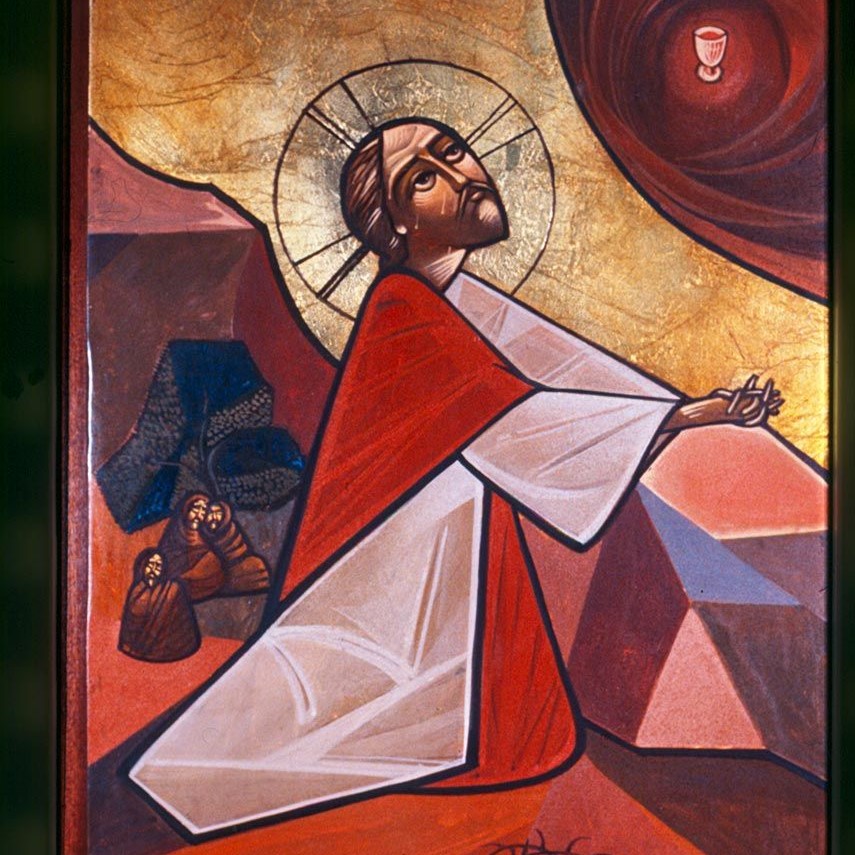
-
The Word of God is not bound
St. Paul, in his first letter to Timothy in the first chapter and second part of verse nine writes:
The word of God is not bound.
How does God speak his good word to us? In the Bible, the author of the book of Hebrews says,
“Long ago, at many times and in many ways, God spoke to our fathers by the prophets, but in these last days he has spoken to us by his Son, whom he appointed the heir of all things, through whom also he created the world. He is the radiance of the glory of God and the exact imprint of his nature, and he upholds the universe by the word of his power… (Hebrews 1:1–3, ESV)
You see, in the ultimate and most important sense, Jesus is the word of God that cannot be bound. All the Scriptures are words of God that refer to the Word that is God come to us as one of us. The Gospel writer John said,
“In the beginning was the Word, and the Word was with God, and the Word was God. He was in the beginning with God. All things were made through him, and without him was not any thing made that was made. In him was life, and the life was the light of men. The light shines in the darkness, and the darkness has not overcome it.” (John 1:1–5, ESV)
You see, Jesus is the very word of God, the personal creational power and pattern of all existence, made incarnate, enfleshed, inseparably uniting complete divinity with full humanity forever.
So, Jesus forgives our sins. Jesus heals our wounds. Jesus draws people into a new community. Jesus lived as every human is meant to live, even when that meant he would die because we would reject him. So we nailed him to a cross and lifted him from the earth to show the world, it would be our way, the way of death, that would reign.
But Jesus would not and could not be bound by our sin. Jesus would not and could not be bound by even death, so he broke the bonds of death, trampling Hell and Satan under his feet. The word of God is not bound!
Yet, Jesus binds us to him, so that:
“… if we have died with him, we will also live with him; if we endure, we will also reign with him; if we deny him, he also will deny us; if we are faithless, he remains faithful— for he cannot deny himself.” (2 Timothy 2:11–13, ESV)
-
Pride & Dignity
We could talk about how every person’s selfish and self-destructive attitudes, actions, and affections disqualify us from deserving anything from God. Pride is a problem because it assumes I deserve something God based on something I have accomplished in myself, and due to sin I can never accomplish the level of goodness that God requires.
This is true, as far as it goes.
But here’s the thing: life with God has never been about human beings deserving something from God because they ever fulfilled some ideal of being quote “good enough.”
How could God, who creates and sustains the universe with a word, ever owe a created thing anything?
The truth is God doesn’t love people because they are owed it. He loves people because that’s just who he is. That’s what he does. He loves.
And this is the life of the universe.
We owe other people the appropriate honor, dignity, and concern not because of they’ve done anything to deserve it, but because regardless of what they’ve done, they are precious in God’s sight. We do deserve to be humbled sometimes because we forget that if we are lovely, it’s only because we are finally coming around to living the light of the truth that God loves us, just because he made us.
If we are in trouble as human beings, it because we reject and refuse that love in a thousand sinful, selfish, and destructive ways. We think we can live on our own apart from God’s love.
Humans have done this since the Garden of Eden!
We’ve all participated in the rejection of God’s love at some level, and this is the fundamental human problem. In this way we can see how pride is very much at the root of many sins, if not all sin. We all need to be accepted, to be loved, to be in fellowship; that’s the root desire that gets twisted into pride.
When by the grace of God we embrace humility as the Way of Christ, we realize we already have what we desire in him.
It’s been there the whole time.
Jesus invites all through the waters of baptism to his table, to his feast, to his banquet, to find true spiritual nourishment in the true bread and true drink of his own cleansing body and blood offered for the sins of the world.
We can come humbly to Christ, confessing and receiving him as Lord of our lives, instead of ourselves and find we are lifted up together as participants is Christ’s resurrection, received as friends of God, adopted as brothers and sisters of Jesus, and made co-heirs with Christ in his eternal Kingdom.
-
On the Narrow Door
Someone comes to Jesus and asks,
“Lord, will those who are saved be few?” (Luke 13:23, ESV)
Jesus doesn’t answer the question, though, at least not directly. He says, ““Strive to enter through the narrow door” (Luke 13:24a, ESV)
What a side step! I think we immediately see two things in this first part of his response: First, the question was the wrong one. If it was the right one, I think Jesus would have answered it. So we can assume from this Christ doesn’t want us worrying about the number of people that are going to be saved into the Kingdom. Even though it wasn’t asked, Jesus cares enough to answer the right question, though, which is will I be saved?
Now, in the immediate context here, the salvation in view is probably specifically referring to the looming judgement that Israel will bring on themselves if they reject Jesus as Messiah and his way of life as essential.
Nevertheless, we would be foolish to think this warning doesn’t apply to every generation and every person!
Jesus wants us be thinking about our selves, our attention, our efforts to enter the Kingdom now, for the sake of eternity.
Now, salvation is always God work in us from beginning to end, but this doesn’t mean he turns us into robots. The same St. Paul that talks about grace through faith in Ephesians also wrote to the Philippians: “… my beloved… work out your own salvation with fear and trembling, for it is God who works in you, both to will and to work for his good pleasure.” (Philippians 2:12–13, ESV)
Remember, grace is opposed to earning, not effort. It’s been said we don’t work for grace, we strive from grace. The availability of salvation, and the power to persevere in it are always given to us, no strings attached. But Jesus will never force us to follow him. Those that want to follow Jesus have to make that decision, and actually follow. This takes real mental and physical effort. This is what Jesus is talking about when he says we are to strive to enter the Kingdom.
But what about the narrow door? Jesus talks about earthly treasure that can’t follow us into heaven in Luke 12. In Hebrews 12, the author encourages the church to lay aside the weight of sin. The door is narrow because there are things that we just can’t bring with us into the Kingdom. We’re going to have to let some things go in order to fit. We certainly can’t bring the physical stuff we accumulate for ourselves. We can’t bring our selfish and self-destructive attitudes, actions, and affections. We can’t bring anything, in other words, that does not look like Christ.
I believe the door is as narrow as the Cross where Jesus died.
It was there, at the cross, that Christ was glorified, that his rule of love was made manifest, and where path from death to life was made straight for us. Jesus, in his perfect humanity and divinity, was able to make a way for all of us still caught up in all forms of evil and death. He went ahead of all humanity, blazing a trail with the light of his love, his forgiveness, and his victory over sin. He did something that would be impossible for any of us on our own: he came out the other side of the death—Resurrected, never to die again. Not only does he continue to shine that light for us to see the way, but he sends his Spirit of grace to empower us with his very life, so that we too can follow him through the narrow way of the cross, endure death and share in the Resurrection.
So we can and must strive by grace and in faith for the Cross of Christ, to cling to it, and not just the idea of it.
It is not enough to simply know about Jesus. To enjoy his presence from time to time, on our own terms. We can’t assume that we will enter the Kingdom now or ever, just because we participate in Holy Eucharist sometimes and listen to Bible teachers on YouTube, if our efforts do not continue to direct us toward Jesus in our overall way of life.
It is not enough to simply acknowledge in our minds that his way is The Way, without putting for the effort to truly walk in it in the present. The warning here is unavoidable: there will be consequences for not walking through the door while it is open, and there will be a time where some will want to walk through it, but will have simply waited to long. There are some people that will respond to Christ at the last minute, and truly follow him—while others will have been around Jesus for awhile, and never take a real step toward him.
“And people will come from east and west, and from north and south, and recline at table in the kingdom of God. And behold, some are last who will be first, and some are first who will be last.”” (Luke 13:29–30, ESV)
Those that come immediately into the Kingdom, even if they are last to hear about it, will nevertheless find the Bread of Heaven which will keep them to eternal life. Those that delay in following Christ, even if they’ve known of him for a long while, will live to regret it.
To enter the narrow door to the Kingdom of God now and forever, we must strive to participate in the cross-shaped life of Christ, today. Not tomorrow, when we wrongly think we’ll be more prepared. The door might be shut then.
But today.

-
A Faith That Sings
Reflections on Mary’s Song (Luke 1:46–55)
Our Christian faith is a faith that sings.
The people of God have always sung about our God and his goodness to us. We live in a cultural context—and sometimes even a church context—where we are forgetting how to sing.
On a very practical level, singing isn’t something many people get together to do anymore. Maybe, maybe around Christmas. Even in the church I notice some people choosing not to sing and let the worship leader do it for them. Of course, I think this is a sad mistake.
When we sing, something changes in our minds and hearts. And something changes even further when we sing words that are married to the truth of who God is and who we are. Grace can take root in those moments in special ways.
Mary, as she always does when we take her on her own terms, helps us to worship God by pointing us to Jesus. Through her song, the Magnificat, she helps us to understand true worship. Many worship songs have come and gone over the centuries, hers has stood fast—what is it about the Mary’s song that makes it the kind of worship song that will last into eternity?
There’s a lot, but let me draw out just three things for our time together today.
First, it’s a song that places God at the center. This is how it begins: “My soul magnifies the Lord.” My soul makes God bigger to me and to those around me. Notice this is God-centered, but it doesn’t neglect the impact on the individual.
But also notice—and here’s the second thing—that the emphasis, when it comes to the individual, is on humility. “He has looked on the humble estate of his servant.” There is an honest acknowledgment from Mary that she is poor and oppressed. She and her people need God to act, not just in quote “spiritual” ways, but in ways that affect the concrete reality of their existence, in ways that prove that God keeps his promises, even when we human beings do not. This is why his mercy is needed.
This is the third observation: The joy comes as Mary recognizes that the mercy of God has always been for those that fear him, that is, those who understand that God’s purifying love is what must direct their lives in order for them to flourish. And the ultimate expression of God’s purifying love, the kind of love that lifts up the lowly but puts the proud in their place, is being born in Mary’s body.
Jesus, though he never sinned, bears the ultimate consequence of humanity’s selfish and self-destructive attitudes, actions, affections in his body as he dies on a cross. Yet, in his mercy he forgives every sin, even the sin of killing God, and so death begins to come undone and he is raised from death to Resurrection life in the power of the Holy Spirit. That’s the life that he gives freely and without reservation to all that will take it. It’s a life that makes a concrete difference for everyone who receives it—how could anyone stay the same after encountering and receiving in themselves the very life of God?
This is why Mary burst into song.
So, of course, the songs we sing matter. Are they God centered? Are they humble? Do they exalt God’s concrete action in the world in Jesus Christ? These are important questions. But the questions go deeper: Am I in my whole life, singing a song that would resonate with Mary’s? In other words, Am I God centered? Am I honest with myself about my concrete need for God? And am I trusting God to meet those needs for me in his Son, Jesus?
The Good News of the Magnificat is that God is God which means I don’t have to be. You and I can acknowledge our need, and live a life that marked by joyful thanks for God’s provision in Christ.
That’s a song worth singing a thousand different ways—and worth teaching the world to sing too—with our lips, and our lives, and from our hearts.
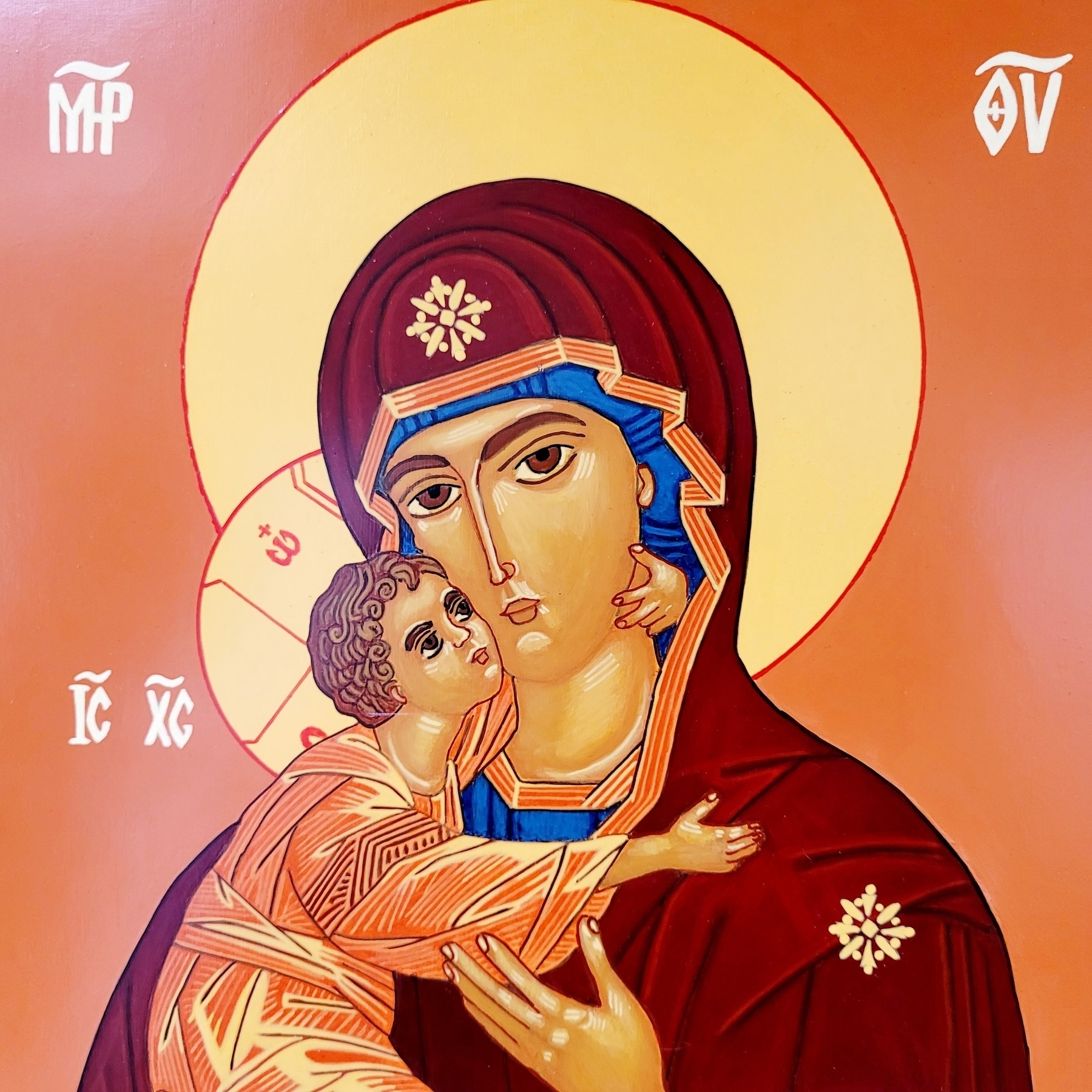
Photo: Icon written by Dennis Maloney
-
Today the Church celebrates James the Elder, Apostle.
O gracious God, your servant and apostle James was first among the Twelve to suffer martyrdom for the Name of Jesus Christ: Pour out upon the leaders of your Church that spirit of self-denying service, by which they may have true authority among your people; through Jesus Christ our Lord, who lives and reigns with you and the Holy Spirit, one God, now and for ever. Amen.
Art: Calling of Saint James and Saint John, James Tissot 1886-1894

-
Today at St. George’s Anglican Church Pastor Shane reminded us that pride is the source of judgmentalism, and that ultimately, no one has any cause to compare themselves to others.
All pride in ourselves is ultimatley misplaced, because we all miss the mark when it comes to what’s most important: eternal life now and forever.
God pours out his mercy on all, and that’s all that matters.
-
Hope for the renewal of all things in and because of Jesus is what keeps me going when I consider and experience the suffering of the world. I’ve also found light in the ways that ultimate renewal manifests in the present–in true worship, in acts of kindness between strangers, in the refusal to receive the injustices of the world as the status quo.
-
Christians, prayer for the world is an essential aspect of our vocation
Christian brothers and sisters, Prayer for the world is an essential aspect of our vocation.
We must stand firm in prayer always, and especially in this terrible moment for our human family that is unfolding in Ukraine.
Let us pray:
Eternal God, in whose perfect kingdom no sword is drawn but the sword of righteousness, no strength known but the strength of love: So mightily spread abroad your Spirit, that all peoples may be gathered under the banner of the Prince of Peace; to whom be dominion and glory, now and for ever. Amen.
Almighty God, from whom all thoughts of truth and peace proceed: Kindle, we pray, in the hearts of all people the true love of peace, and guide with your pure and peaceable wisdom those who take counsel for the nations of the earth; that in tranquility your kingdom may go forward, till the earth is filled with the knowledge of your love; through Jesus Christ our Lord. Amen.
O God, the Creator of all, whose Son commanded us to love our enemies: Lead them and us from prejudice to truth; deliver them and us from hatred, cruelty, and revenge; and in your good time enable us all to stand reconciled before you in Jesus Christ; in whose Name we pray. Amen.
Prayers from BCP2019 p. 654-655
-
You are God's Delight
It’s the Third Day of Christmas. We remember St. John the Theologian.
He wrote:
“…the Word became flesh and dwelt among us, and we have seen his glory, glory as of the only Son from the Father, full of grace and truth.” (John 1:14, ESV)
This is an indispensable part of the Good News: God delights in humanity! Why else would he become one?
God doesn’t become something he doesn’t love.
And—get this—God delights in you!
We are told in the Scriptures that—by the Spirit—the Word of God dwells in all who will receive him, which is our guarantee of eternal life.
God doesn’t dwell where he doesn’t want to be.
“Shed upon your Church, O Lord, the brightness of your light; that we, being illumined by the teaching of your apostle and evangelist John, may so walk in the light of your truth, that at length we may attain to the fullness of eternal life; through Jesus Christ our Lord, who lives and reigns with you and the Holy Spirit, one God, for ever and ever. Amen.”
Promise & presence. Light & life. This is Christmas.
Photo: www.blessedmart.com/shop/hand…
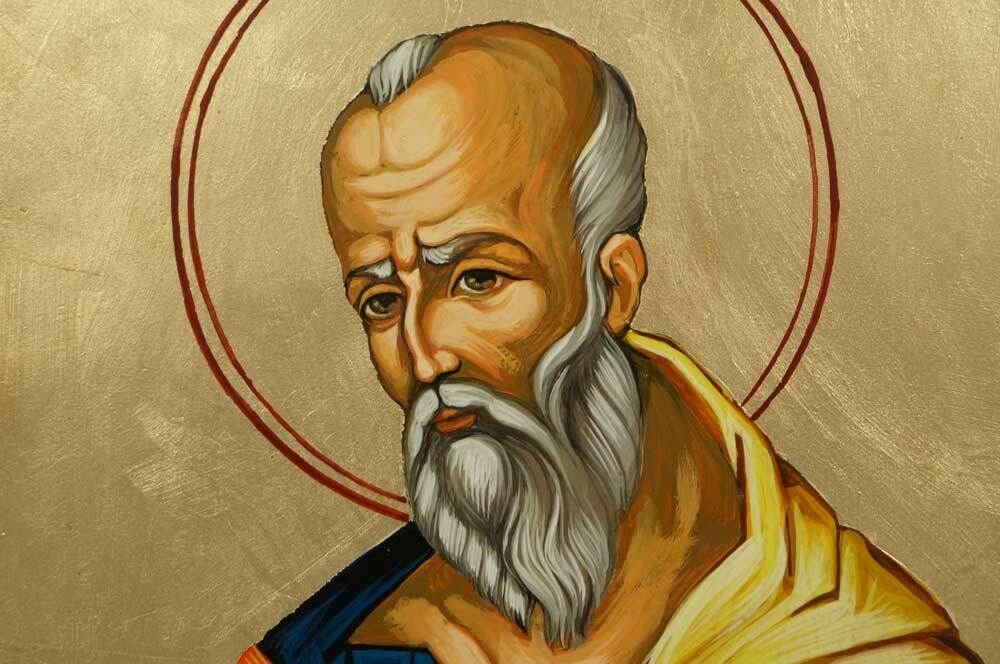
-
The Kingdom of Christ is fundamentally spiritual, but not merely spiritual
What makes a good king different from a bad king is the kind of power used and the way that power is used.
The thing that destines every king to fail is the unavoidable—and for every worldly king at some point irresistible—temptation to use their power to benefit themselves at the expense of others.
Devotional writer Jane Williams says,
“…what Jesus is offering as a description of his own kingship is truth—reality, you might say. Revelation calls it ‘the Alpha and Omega, who was and is and is to come’. If the actual reality of the world, from its creation to its end, is like Jesus, then this strange human obsession with power is an aberration. It has no ability to create, to redeem or to sanctify. Jesus’s challenge to Pilate’s kind of power is too slow and subtle for many of us, who long to use the weapons of worldly power to force victory for God. But if Jesus is the truth, then any other way is falsehood, and will fail. Reality, as it was and is and is to come, is shaped by a different kingship.”
Jesus lives as King over a kingdom that is certainly powerful, but he draws on a power not from this fallen world.
Jesus rules and reigns and fights battles in this world through the power of self-giving love and truth, which can only come from God himself.
His Kingdom is fundamentally spiritual in that it is conceived, birthed, and animated by the Spirit of Love who is God the Holy Spirit, but it is not merely spiritual because this Spirit takes up residence in his subjects, his followers, for the sake of the world.
-
7 encouragements for the deconstructing
“Deconstruction” is the topic du jour in the Christian social media space right now. It’s the recognition that many former “evangelicals” America–especially younger ones, and in large numbers–are rapidly rejecting parts of their evangelical faith and culture.
As someone who has had my own unique deconstruction journey (and in many ways continue that journey to this day) I want to say to those currently in the process:
-
I see you, and you are not alone, as disorienting, scary, painful, and disturbing as the process can be
-
I know you are probably in this for good reasons. We all have certain beliefs and values that need to be deconstructed and some that need to be outright rejected
-
To the extent you are deconstructing beliefs and values that do not align with the Jesus presented in the Gospel and witnessed to by the church catholic, you are on the right track
-
There is room within the Christian family for those who doubt, question, and explore
-
You are loved by Jesus. He is secure enough to welcome your questions, and close enough bear your uncertainty, and kind enough meet you where you are in this moment
-
No matter how much you feel like you are falling apart, there is hope and a path for “reconstruction” and most of all Resurrection because (see #5)
-
I’ll say it again, you are not alone.
-
-
A present friend
Watched the Disney version of The Lion, the Witch, and the Wardrobe last night with the kids. Haven’t seen it since it released in theaters. Haven’t read the book since just before that.
It’s far from perfect and the vfx are dated, but I still found it moving.
There’s no doubt for me–after this latest revisit to Narnia–that Lewis set the stage for me to be an Anglican, to recieve a patristic understanding of the atonement, to find echoes of Christ in all the great myths, to understand the Gospel as world-changing and beautiful and mysterious and tangible.
I think what was so moving for me this time around was a sense of gratitude for this childhood mentor that I never met and died before I was born, and still yet seems be a present friend.

-
We can have courage to confess our sins, because God in Christ in Christ gives us assurance of forgiveness.
-
Nationalism, Christianity, encouragement -- and regret
It’s encouraging to see there are gestures in America toward a renewed humility in the so-called “prophetic” movement.
This idolotrous, nationalist strain of the charismatic world is essentially the same thing as what we see corrupting evangelicalism.
Both claim divine revelation in their effort to legitimize a “power-and-profit by whatever means necessary” mentality.
For charismatics, it’s a supposedly direct “word” asserted with unjustified confidence and unfounded authority; for evangelicals it’s a conveniently malleable set of “biblical principles.”
Both are false teachings with soul-poisoning consequences, because both are divorced from Jesus as the Supreme Revelation of God in the Gospels.
Both demand a very different kind of life than our Lord taught us to live, namely a life enslaved to fear instead of liberated, quiet confidence.
One of my profound regrets as a pastor and just as a Christian brother is not clearly and boldly doing constant ground work to address these destructive trends much earlier in the communities I am a part of.
I knew they were problems “out there”; I simply (and naively) didn’t imagine they would take root (or had already become embedded) among people I know and love.
I pray for grace and wisdom, true prophetic insight and evangelical zeal to follow the Spirit of the Lord and witness faithfully to the fullness of God in Christ, given for the world.
-
Thankfully, my country is not my church
As those of us in the U.S. prepare for 4th of July festivities, I want to recognize the main things I am grateful for as an American: Unprecedented freedom of religion, broad cultural support–at least in principle–for transcendent human rights, and some of the most beautiful landscapes in the world.
At the same time I recognize my country has often fallen tragically–even horrifically–short of its ideals, and in fact was founded on and remains committed to certain concepts, assumptions, and practices that are fundamentally incompatible with my faith.
It is important for me to rember that no matter how influenced the United States has been or will be by Christianity, my country is not my savior, my hope, or my church, and could never be.
I am thankful to be a “resident alien” in the USA. And I pray for grace to be a good citizen and serve my fellow Americans so they will know the goodness of God in Christ.
But my allegiance–and the foundational focus of my energy and attention–can only ever be to Christ alone and his people in every nation.
-
Love & Deconstruction
Like many my age and younger, I went through a fairly severe period of deconstructing my faith, trying to make sense of what we read in the teachings of Jesus in light of my day-to-day experiences in places claiming to be expressions of his church.
Let me tell you my deconstruction was catalyzed by both intellectual and relational challenges, but neither slam-dunk arguments nor platitudes initiated a reconstruction.
Instead, it was faith working in love through a few of God’s people.
Instead of simply throwing their hands up in despair, they encouraged (not guilted) me not to give up (I wanted to), faithfully walking with me, even as I grumbled and protested.
Instead of deconstructing my deconstruction, they treated me like family.
Instead of arguing with my reasons for despair, they actively showed me a reason to hope by their example.
Instead of picking apart my faulty doctrine, they simply, patiently, gently witnessed to the character of God in Christ.
Instead of asking me to get it together, they invited and included me in the liturgical and social life of the church.
Room was given for doubt, for questions, for frustration, for grief, for healing, for exploration.
The main thing was that I always knew I was loved–and that love was from God–but it was made visible and tangible by his people.
-
In my experience, it seems the default position of many Christians towards their siblings in Christ is one of distrust.
Often, there are good reasons for this.
Other times, it’s really about a lack of faith in the power and provision of God in Christ–by the Spirit–to see us through relational risk and disagreement.
Either way, God calls his people toward a kind of Spirit-powered love that results in well-founded mutual confidence over and against underlying, anxious suspicion.
It is not so much about simply trusting people more per se, but rather a deeper entrusting of ourselves and our Christian family to Christ, so that confidence is built on the demonstrated desire for one another to have–above all–greater communion with Christ, in the non-violent, non-coercive, truthful-yet-graceful way of Christ.
Photo by Brett Jordan on Unsplash

-
A sermon after January 6
Here’s last Sunday’s sermon for those that might be interested, in which I attempt to consider the recent terrorist attack on the Capitol building in light the of day’s Scriptures, and particular in light of how our baptism joins every Christian to the vocation of Christ.
The opening remarks were not recorded, but here’s the relevant section from my manuscript:
I think we have all felt acute distress in the past week, and understandably so. Not only has the pandemic continued to cause all kinds of death, destruction and suffering in our city and state, but we witnessed what has been described by experts as a violent, terrorist attack on our nation’s Capitol building by a politically and religiously motivated mob.
This is a time that calls for clarity and directness from Christian leaders and from the Church. So I have tried to choose all of my words for this message with special care and precision. I have sought counsel and prayer. I do not intend or wish to offend in any way. However, I do want speak truthfully and candidly. I watched in horror—live—as the mob grew more and more restless, ultimately overrunning the police and breaking in the building to disturb the legitimate democratic process. And I was so dismayed to see several images of those in the crowd carrying banners that said “Jesus Saves,” along with the so-called “Christian flag,” crosses, and many other Christian symbols and sayings. The crowd held banners proclaiming “Jesus is my Savior. Trump is my President.” To be clear, the increasingly close association of the Christian faith with American nationalism and partisan extremes is precisely why it is important for us to address this specific event as a church family…
Here’s a link to the complete manuscript.
-
A Culture of Unhealthy Silence
I reject the notion that the solution to any communal tension is to pretend it doesn’t exist by not talking about it.
As a pastor I have been explicitly discouraged on occasion from speaking about certain topics in the church because the topic itself–not simply the way or time in which in which it was approached–was considered inherently divisive.
Yet topics in themselves do not have the power to divide. Only our reactions and responses to them do.
And by not speaking about difficult topics openly and keeping each other accountable to loving, respectful dialog, we rob ourselves of the opportunity to actually resolve tensions in a healthy way.
We have already surrendered to the demonic spirit of division.
By fostering a culture of unhealthy silence, we sponsor a culture of suspicion that necessarily leads to fear, relational rejection, and pain.
Worst of all, we are behaving as if our mutual faith in Christ and love for Christ in one another is not truly enough to be the ground and glue of our relationships.
Either we can trust Christ and his Spirit with our whole selves and community (including disagreements and tensions) or we can’t.
I believe Christ is trustworthy.
-
The distinguishing mark of the Church
I wholeheartedly believe the church is meant to credibly model and offer a different way of life than what the rest of the world experiences.
In particular, the distinguishing mark of the church is radical love for one another, for the sake of Christ.
As long as Sundays remain mostly segregated…
As long as women are discouraged from exercising their spiritual gifts and demeaned when they do…
As long as children sense they are a burden in the worship service…
As long as singles don’t find a sense of real, every-day family in the household of faith…
As long as keeping the peace is more important than peacemaking in our communities…
As long as certain topics are “off limits” for fear of offense in our gatherings…
As long as we demand and are satisfied with worldly ways of leading congregations…
As long as we act as if our obligations to one another are met via an occasional check in the offering and pleasantries in the parking lot…
As long as convenience and preference are the determining factors for level of involvement and degree of commitment…
As long as we allow American partisan differences to sow demonic division instead of inspire biblical discussion…
…we are missing our vocation of radical love for one another!
subscribe via RSS